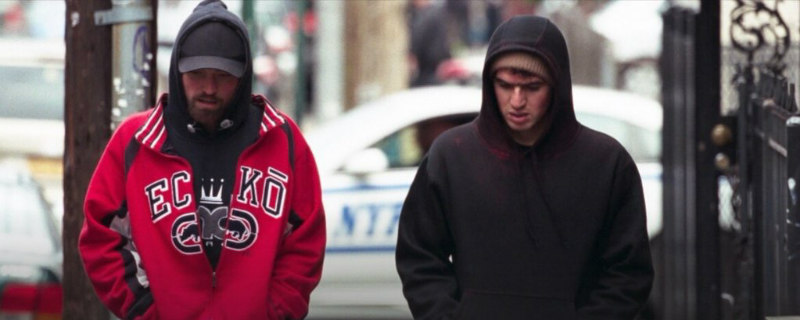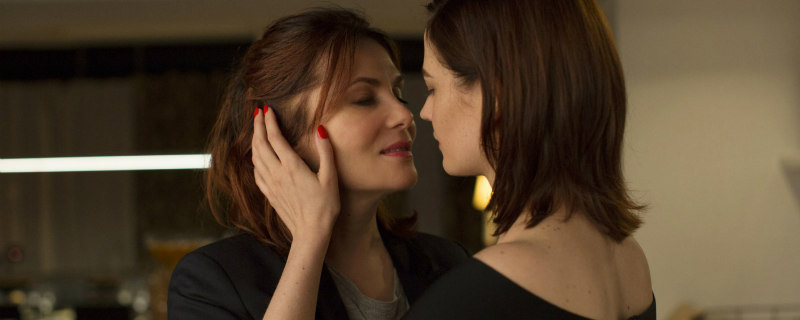
A final roundup of the movies we checked out at this year's fest.
Words by John Bennett
This year at Cannes, it was unclear which movies, if any, would ignite as award season favorites. Many were too dark or experimental to please the Oscar/Golden Globe crowd, and many did not offer meaty performances that stood out as the kind that win major recognition. In spite of this reason (or perhaps exactly because of it), many of the films at the 2017 Cannes Film Festival serve as potential end-of-year alternatives to bland Oscar-bait, not to mention Hollywood blockbusters.
Good Time


Speaking of, in a perfect world, all Hollywood blockbusters would resemble Joshua and Ben Safdie’s Good Time in their style and their ability to buoyantly entertain. Robert Pattinson plays Connie (an annoyingly unnecessary name, I know), a petty criminal who plans a heist with his mentally disabled brother Nick (Ben Safdie). After the heist goes awry, Connie tries to fix his situation through various crazy strategies and plans, each of which only serves to put him in an even tighter bind. As Connie gets himself deeper and deeper into trouble, we’re always delighted at what bonkers turn Good Time will take next. Yet, though the film is a stylish, neon lark, it doesn’t raise particularly interesting questions or make particularly interesting observations; you’ll have a fantastically good time with Good Time, which is worth something, if not everything.
A Gentle Creature

After Zvyaginstev’s Loveless played early on in the festival, Russia had another strong entry in competition with A Gentle Creature, the new film by the imaginative Sergei Loznitsa. Whereas Loveless has a novelistic approach to its characters, A Gentle Creature uses heavy symbolism to explore the ills of Russian society. An unnamed woman (an astounding Vasiliva Makovsteva) finds that a package she sent to her imprisoned husband has been returned to her without explanation. This leads her on an odyssey to find out where her husband is and why she can’t communicate with him. The woman herself is a silent cipher who listens stone-faced as various monstrous individuals - each of whom represent some aspect of a broken society - berate and explain themselves to her. The last lengthy set-piece is a marvelous hallucinatory summary of what we - and Loznista’s Bressonian heroine - have witnessed and observed over the course of the film. A Gentle Creature is the kind of film that will linger in the mind as a display of art-house virtuosity for a long time.

In the Fade

Director Fatih Akin continues his exploration of Turkish/German relations with In the Fade, an emotional thriller/courtroom drama. When Katja (a fantastic Diane Kruger) loses her Turkish husband and young son to a foul-play explosion in Berlin, she single-mindedly, self-destructively dedicates herself to finding the perpetrators. When they are apprehended, In the Fade becomes an intensely involving court room procedural, before morphing once more into a patient, thoughtful revenge drama (a genre that is so rarely patient or thoughtful) in its last act. In terms of its story, In the Fade may seem somewhat formulaic - but the film is so engaging as it works within that formula that it never feels predictable. If In the Fade demonstrated a little more of Akin’s punchy, heated style (on full display in a film like 2004's Head-On), it could have been a perfect movie. But you won’t be thinking of those regrets watching In the Fade - you’ll just follow along in fascination as Akin and Kruger skillfully and honestly guide you through a strong political thriller.

L'Amant Double

The ostensible thriller in competition that’s much less thrilling than In the Fade is Francois Ozon’s L’Amant Double. In Ozon’s erotic film, Chloe (Marine Vacth) visits a psychologist, Paul (Jeremie Renier), whom she eventually begins dating. She’s content with Paul until she begins seeing his sinister, seductive twin, Louis, as her new psychologist. A series of secrets and lies ensue, each more erotic than the last. L’Amant Double is silly without being very fun, intense without being very thrilling, and erotic without being very sexy. Vacth and Renier (along with Ozon’s direction) are beautiful to look at but execute their functions without much flair or flavor. It’s not a bad movie, but it’s just not especially interesting.

Walking Past the Future

From the Un Certain Regard competition, we checked out Walking Past the Future from Chinese director Li Ruijun. Though the film is inexcusably overlong, Walking Past the Future is an effective, heartbreaking look at the difference between urban and rural Chinese life and the arduous financial process many must undertake to manage to live in urban areas. Li’s style recalls Hou Hsiao-Hsien’s Flowers of Shanghai - it’s a style that favours long takes that slowly pan back and forth between characters, allowing the emotional significance of conversations to decant and resonate. Though the film could be more organised, it’s real, raw, and powerful.

You Were Never Really Here

Lynne Ramsay was back at Cannes for the first time since 2011 with You Were Never Really Here, a gritty thriller that follows Joe (Joaquin Phoenix), a veteran with underworld connections, hired by a New York politician to save his daughter from a child-sex ring. The cool thing about You Were Never Really Here is that it harkens back, possibly more than any film of this century thus far, to the consistently strong gritty American crime films of the '70s, like The Conversation, The French Connection, Taxi Driver, or The Taking of Pelham One Two Three. Ramsay is guilty of having a slightly top-heavy style - a style that’s showy and a bit detached from the film’s content - but even so, her visuals are relentlessly ravishing and inventive. Phoenix, a normally hammy actor who has trouble blending into a film, has never been better. You Were Never Really Here may not be a perfect film, but it’s certainly a satisfying one.

Based on a True Story

The legendary Roman Polanski returned to the Croisette this year as well with Based on a True Story, which played out of competition. Polanski’s wife, the talented Emmanuelle Seigner, plays Delphine de Vigan (a real author who wrote the novel on which the film is based). Delphine, exhausted by her own success, begins a friendship with Elle (Eva Green), a woman always ready with an astute observation about Vigan’s writing. Elle begins to insinuate herself more and more into Vigan’s work and life, and eventually her obsession with the writer takes a sinister turn. This scenario had all the makings of a classic Polanski, but unfortunately Based on a True Story never fascinates or unnerves as wonderfully as Polanski’s past work. Some of the film’s problems lie in its unevenly paced story, a problem that is not helped by the one-note villainy of the mediocre Green. Based on a True Story has some cool spooky moments for the die-hard Polanski fans, but the film is pretty slack otherwise.

120 Beats Per Minute

On the last day of the festival, we caught up with 120 Beats Per Minute and The Meyerowitz Stories, both of which had premiered earlier in the festival. Robin Campillo’s 120 Beats Per Minute may have been Cannes’ most moving film. Set in Paris in the '80s, the film details the mobilisation of the Act Up Paris movement, an organisation that creatively and nonviolently disrupted society to demand a more aggressive governmental and business response to the AIDS epidemic. The film zeroes in on two central members, one of whom suffers from the disease, as the film details the group’s process for debating and implementing protest strategies to raise awareness and demand equality. 120 Beats Per Minute stirringly captures the sense of urgency felt by many of these activists while giving an emotionally honest account of a gay romance as well; it’s a moving, intelligent film that skillfully functions as both a robust portrait of a movement and an intimate love story. Campillo adds light touches of stylisation at certain times to punctuate the film’s most dramatic moments. The film brilliantly blends into one such moment at the end - a moment that will leave you breathless and in tears.

The Meyerowitz Stories

Less impressive was Noah Baumbach’s The Meyerowitz Stories (New and Selected). Following the foibles of a dysfunctional New York family (with Dustin Hoffmann as the patriarch and Ben Stiller, Adam Sandler and Elizabeth Marvel as his varyingly neurotic children), The Meyerowitz Stories is consistently fun to watch. But Baumbach always sabotages his own good work with a self-aware, sugary, irritating cuteness. The Meyerowitz Stories often explores genuinely moving territory, textured by different characters who are realistically unable to communicate successfully with one another (or even with themselves). But when Sandler yells at traffic or when Stiller gives an embarrassingly personal speech at an art opening, the film panders more than it reflects. Once Baumbach exorcises his work of its showy preciousness, its unchecked self-pity, and its lazy comedy, he could have the potential to make a really great film.

Twin Peaks: The Return

One of the festival’s most wonderful moments was the special screening of the first two episodes of David Lynch’s anxiously anticipated revitalisation of Twin Peaks. Though the episodes had already debuted earlier in the month, Lynch was warmly welcomed back to Cannes. At the premiere, Cannes General Delegate Thierry Fremaux, who usually announces directors at premieres with a simple “Mesdames et Messieurs,” gave a long speech about how much it meant to the film world to have Lynch back at Cannes after a long absence. As you probably already know, the revamp of the classic cult show is absolutely astonishing; it deepens and expands the original show’s daffy quirkiness, its unsettling darkness, and its profound mystery in ways that are unexpected and endearingly familiar. Though the work has not yet been seen in its entirety (thus making our five-star rating provisional), the first episodes are boundlessly promising, and Lynch’s reception at Cannes was something truly special indeed. It’s moments like these that remind us how much the Cannes Film Festival values and promotes artists in an industry in which profit and franchise are so often put before quality, expression, and experimentation. It’s moments like these that remind us why Cannes is great.

Some final notes:
You’ll hear that this year’s festival had a disappointing line-up of films in competition. Though the official selection didn’t have quite as many astounding films as last year, there are a good dozen or so truly solid films that came from this year’s festival that are absolutely worth checking out.
Though last year’s competition was stronger, the prizes awarded by the festival’s jury were far more reflective of the films’ quality. This can possibly be attributed to the presence of the jury president Pedro Almodovar, a director with a capacious appreciation for human spirit and diversity. I am a detractor of last year’s jury president, George Miller, whose middling qualities as a director seem consistent with his middling picks for the festival’s top prizes.
My biggest regret: not getting the chance to see Sean Baker’s The Florida Project. It’s gotten great press thus far, and it was picked up by the increasingly prestigious A24 for distribution. Keep an eye out for its future release.
For what it’s worth, here is my complete ranking of the films I saw, of which only the bottom five or six are abundantly flawed.
Loveless
The Square
120 Beats per Minute
The Beguiled
Visages/Villages
A Gentle Creature
In the Fade
Let the Sunshine In
The Day After
You Were Never Really Here
Jupiter’s Moon
Good Time
Le Redoutable
Jeannette: The Childhood of Jeanne d’Arc
The Killing of a Sacred Deer
La Familia
Alive in France
Walking Past the Future
Wonderstruck
Happy End
Radiance
The Rider
La Defensa del Dragon
After the War
Rodin
The Meyerowitz Stories
Okja
L’Amant Double
Based on a True Story
West of the Jordan River
Ismael’s Ghosts
With a special shout-out to the ongoing Twin Peaks.

